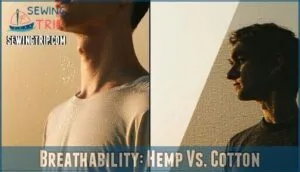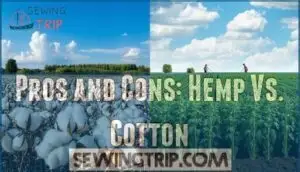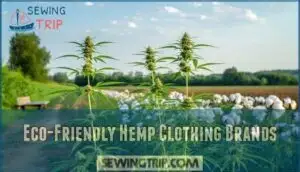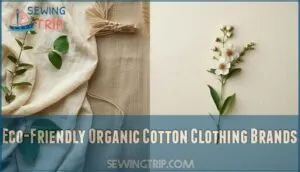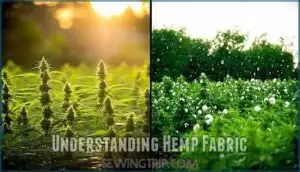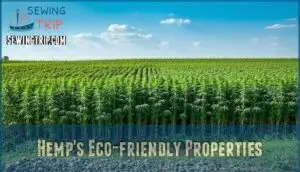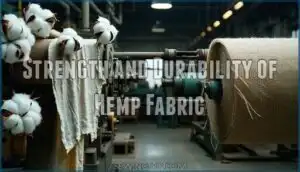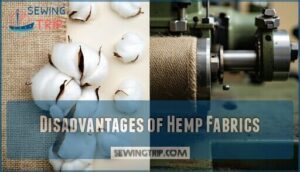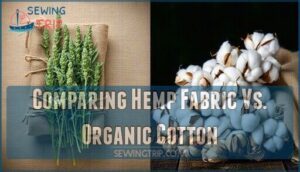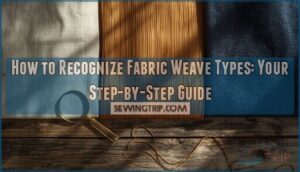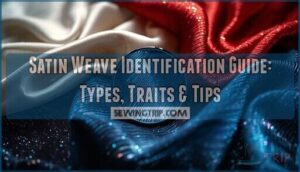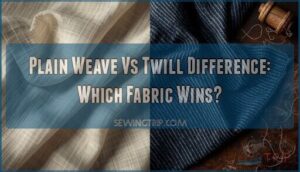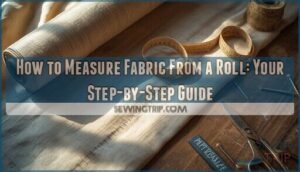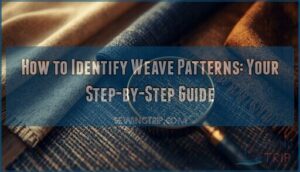This site is supported by our readers. We may earn a commission, at no cost to you, if you purchase through links.
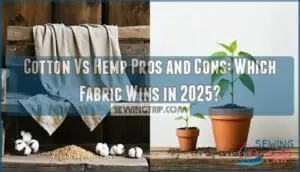
Hemp needs 50% less water than cotton and grows without pesticides, actually improving soil health.
It’s also three times stronger and naturally antimicrobial. Cotton’s main advantage? It’s softer right out of the gate, while hemp starts stiff but becomes buttery-soft with wear.
Hemp breathes better too, keeping you cooler in summer. Cotton’s cheaper upfront, but hemp lasts longer, making it more economical over time.
The choice comes down to immediate comfort versus long-term value and environmental impact. There’s more to this fabric showdown than meets the eye.
Table Of Contents
- Key Takeaways
- The Environmental Impact of Hemp Vs. Cotton
- Durability: Hemp Vs. Cotton
- Breathability: Hemp Vs. Cotton
- Pros and Cons: Hemp Vs. Cotton
- Eco-Friendly Hemp Clothing Brands
- Eco-Friendly Organic Cotton Clothing Brands
- Understanding Hemp Fabric
- Benefits of Hemp Fabrics
- Disadvantages of Hemp Fabrics
- Comparing Hemp Fabric Vs. Organic Cotton
- Frequently Asked Questions (FAQs)
- Conclusion
Key Takeaways
- You’ll save significantly on water and environmental impact – Hemp uses 50% less water than cotton and grows without pesticides, while cotton consumes 16% of the world’s pesticide supply and requires massive water resources.
- You’re investing in superior durability and longevity – Hemp fabric lasts 7-10 years compared to cotton’s 3-5 years, with 4x stronger fibers that maintain integrity through hundreds of washes.
- You’ll experience better breathability and antimicrobial benefits – Hemp naturally resists bacteria and mold while offering excellent airflow, though cotton provides immediate softness and superior moisture absorption.
- You’re choosing between upfront cost versus long-term value – Hemp costs 2-5 times more initially but pays off through extended lifespan, while cotton offers affordable comfort with higher replacement frequency.
The Environmental Impact of Hemp Vs. Cotton
When you’re choosing between hemp and cotton fabrics, the environmental stakes couldn’t be higher.
Hemp uses 20% less water and zero pesticides while cotton consumes 16% of the world’s pesticide supply.
Hemp saves water, skips pesticides – cotton guzzles both while poisoning our planet.
The numbers tell a clear story: hemp produces 250% more fiber per acre and actually improves soil health, making it the clear winner for eco-conscious consumers in 2025.
Conventional Cotton Vs. Organic Cotton
You’re facing a tough choice between conventional cotton’s hidden costs and organic cotton benefits.
Conventional cotton devours resources—using 2,700 liters of water per t-shirt and 25% of global pesticides. Organic cotton cuts water usage by 91% and eliminates toxic chemicals, making sustainable farming possible.
When considering the environmental impact, to make an informed decision, you need to understand organic farming methods.
| Factor | Conventional Cotton | Organic Cotton |
|---|---|---|
| Water Usage | 2,700L per shirt | 243L per shirt |
| Pesticide Use | 25% of global supply | Natural alternatives only |
| Environmental Impact | Soil depletion, pollution | Improved soil health |
The key difference lies in water usage and pesticide use, with organic cotton offering a significantly more environmental and healthy alternative.
Historical Context of Hemp
Understanding hemp’s historical context reveals why you’re seeing this ancient crop making a modern comeback.
Hemp cultivation began around 8,000 BCE in ancient Mesopotamia and China, where Cannabis sativa served multiple purposes from textiles to medicine.
Ancient cultivation spread globally—Vikings carried hemp to Iceland, while Chinese emperors documented its medicinal properties.
For nearly 3,000 years, hemp dominated as the world’s primary fiber source.
Historical farming practices made it essential for ship sails, rope, and paper.
Even America’s founding fathers like George Washington grew hemp, and colonial laws mandated its cultivation.
However, Hemp Prohibition through the 1937 Marihuana Tax Act nearly eliminated this versatile crop.
Hemp Legislation changed dramatically with the 2018 Farm Bill, which you’ll recognize as hemp’s liberation moment.
This Hemp Origins renaissance means you can now choose sustainable hemp textiles backed by millennia of proven performance.
The history of hemp in history is a fascinating topic that highlights its importance.
| Era | Hemp Origins | Ancient Uses |
|---|---|---|
| 8,000 BCE | Mesopotamia/China | Cordage, pottery, food |
| 2,800 BCE | Chinese dynasties | Medicine, textiles |
| 1533 CE | European mandates | Ship rigging, fabric |
| 1606 CE | American colonies | Naval supplies, clothing |
| 2018 CE | U.S. legalization | Sustainable textiles |
Durability: Hemp Vs. Cotton
Hemp fabric delivers exceptional durability that outperforms cotton in every measurable way.
Hemp’s strength isn’t just impressive—it’s revolutionary for conscious consumers seeking lasting quality.
When you invest in hemp clothing, you’re getting material resilience that’s genuinely built to last.
The numbers tell the story clearly.
Hemp strength measures nearly double that of cotton fabric, translating into garments that endure twice as long.
While your average cotton T-shirt survives 3-5 years before showing significant wear, hemp shirts maintain their integrity for over a decade.
Cotton weakness becomes apparent through repeated washing cycles.
Cotton fibers break down faster, developing holes and fraying that hemp simply doesn’t experience.
Hemp’s natural resistance to mold, mildew, and bacteria gives it clear hemp advantages over cotton’s tendency to degrade through moisture retention.
| Durability Factor | Hemp Performance | Cotton Performance |
|---|---|---|
| Tensile Strength | 4x stronger than cotton | Standard baseline strength |
| Fabric Longevity | 10+ years typical lifespan | 3-5 years average lifespan |
| Wash Resistance | Maintains integrity after hundreds of washes | Shows wear after moderate washing |
| Structural Breakdown | Resistant to pilling and abrasion | Prone to holes and fraying |
Textile durability matters for your wallet and wardrobe longevity.
Breathability: Hemp Vs. Cotton
In terms of breathability, you’re weighing two distinct approaches to thermal regulation. Cotton’s natural air permeability makes it champion for moisture management, absorbing up to 27 times its weight in water while allowing sweat to evaporate quickly.
Hemp’s breathability depends entirely on fabric weave – lightweight versions rival cotton’s cooling power, but thicker weaves trap heat like a wool sweater.
| Aspect | Cotton | Hemp |
|---|---|---|
| Moisture Absorption | Excellent (27x weight) | Good (4x more than cotton) |
| Air Flow | Consistent across weights | Varies by weave thickness |
| Drying Speed | Moderate | Fast |
| Summer Comfort | Superior lightweight feel | Good if loosely woven |
| Year-round Use | Limited to warm weather | Versatile with proper weave |
Cotton’s ability to provide natural breathability benefits makes it a popular choice for warm weather clothing. Moisture-wicking fabrics made from cotton excel in hot climates, while hemp offers breathable materials that adapt to different seasons.
Your choice depends on whether you prioritize consistent cooling or seasonal versatility in your wardrobe.
Pros and Cons: Hemp Vs. Cotton
When comparing hemp vs cotton, you’ll discover each fabric brings distinct advantages and challenges to Sustainable Fashion.
| Hemp | Cotton |
|---|---|
| Lasts 20+ years, saves money long-term | Soft comfort from day one |
| Higher Hemp Costs upfront ($30-80/shirt) | Affordable pricing ($10-25/shirt) |
| Natural antibacterial properties | Superior Cotton Quality feel |
Hemp’s durability means fewer replacements, but initial sticker shock affects many budgets.
Cotton pros include immediate softness and widespread availability, while hemp cons involve rougher texture and limited supply chains.
For Fabric Care, hemp becomes softer with washing while maintaining strength.
Cotton requires gentler handling to prevent wear.
Textile Innovation continues improving both materials.
Hemp offers carbon-negative growing and minimal water use.
Cotton provides versatility but demands intensive resources.
Your choice depends on priorities: hemp for longevity and environmental impact, cotton for comfort and accessibility.
Both sustainable fabrics serve different needs in your wardrobe strategy.
Eco-Friendly Hemp Clothing Brands
Looking for authentic sustainable fashion brands that walk the walk? Hemp clothing companies are revolutionizing eco-conscious fashion with innovative materials and ethical practices.
Outerknown leads with premium hemp-cotton blends in their surf-inspired collections, while Jungmaven specializes in pure hemp basics that soften beautifully over time. Taylor Stitch crafts durable hemp shirts and shorts perfect for active lifestyles, and Patagonia incorporates hemp fibers into their outdoor gear.
These eco-friendly textiles offer superior breathability and longevity compared to conventional cotton alternatives. Smaller brands like WAMA Underwear and Recreator create hemp undergarments and activewear that showcase hemp vs cotton advantages.
When you choose these sustainable fabrics from green textiles pioneers, you’re investing in organic apparel that supports regenerative agriculture while building a wardrobe designed to last decades. Many consumers research hemp clothing brands to find the best options for their lifestyle.
Eco-Friendly Organic Cotton Clothing Brands
When you’re building a sustainable wardrobe, choosing the right eco-conscious fashion brands makes all the difference. Organic cotton clothing offers a perfect starting point for environmentally aware consumers seeking comfort without compromise.
PACT leads the sustainable fashion movement with certified organic materials that eliminate harmful pesticides and GMOs from production. Their commitment extends beyond green textiles to fair labor practices throughout their supply chain.
- Organic cotton basics: Durable tees and underwear crafted from natural fibers
- Environmental benefits: 85% less water usage compared to conventional cotton production
- Quality construction: Long-lasting pieces that resist wear while maintaining softness
PACT’s organic cotton garments demonstrate how environmental apparel doesn’t sacrifice style or durability. Their eco-friendly textiles prove that sustainable fashion can deliver both comfort and conscience. By choosing organic materials, you’re supporting regenerative farming practices while building a wardrobe that aligns with your values and lifestyle needs. Consumers can explore various organic cotton options to find the best fit for their sustainable fashion goals.
Understanding Hemp Fabric
Hemp fabric revolutionizes sustainable fashion through its remarkable properties and eco-friendly production methods. This natural fiber comes from the cannabis plant’s stalks, creating textiles that outperform traditional materials in multiple ways.
| Property | Hemp Fabric | Cotton Fabric |
|---|---|---|
| Water Usage | 700-1,500 gallons per 2.2 lbs | 2,700 liters per t-shirt |
| Tensile Strength | 4x stronger | Standard baseline |
| Growth Time | 3 months | 6+ months |
Hemp production requires minimal pesticides while improving soil health through natural detoxification. The fabric care process becomes simpler since hemp textiles resist mold and bacteria naturally. Hemp vs cotton comparisons consistently favor hemp’s durability and environmental impact.
Modern processing eliminates traditional disadvantages of hemp fabric, creating softer textures without sacrificing strength. These eco materials represent the future of responsible clothing manufacturing, offering consumers high-performance natural fibers for their wardrobes. The choice between natural and synthetic fibers often depends on understanding breathability factors that affect wearer comfort, highlighting the importance of natural fibers and responsible clothing.
Benefits of Hemp Fabrics
You’ll discover that hemp fabric offers compelling advantages that make it stand out in today’s sustainable textile market.
Hemp’s unique properties combine environmental responsibility with exceptional performance characteristics that cotton simply can’t match, highlighting its sustainable nature.
Hemp’s Eco-friendly Properties
When you’re choosing sustainable textiles, hemp stands out as nature’s environmental champion.
This renewable resource requires 50-70% less water than cotton while absorbing 8-22 tonnes of CO₂ per hectare.
Hemp’s sustainable farming practices eliminate pesticides, creating truly eco-friendly textiles with minimal carbon footprint.
These biodegradable materials prove that green materials can revolutionize environmental impact without sacrificing quality.
The use of hemp fabric products can substantially enhance the eco-friendly properties of various applications.
Strength and Durability of Hemp Fabric
When you’re investing in clothing, you want textiles that won’t fall apart after a few months.
Hemp fiber delivers impressive textile strength—measuring nearly double cotton’s durability in standard tests.
This material resilience means your hemp garments can withstand hundreds of washes while maintaining their structural integrity.
Hemp fabric’s superior tensile strength translates to fabric longevity that outlasts cotton by years, making it a smart choice for long-term wardrobe investments with impressive durability.
Versatility of Hemp Textiles
Surprisingly, hemp textiles adapt to countless applications beyond basic clothing.
Hemp weaving creates everything from sturdy canvas to delicate lace, while hemp knitting produces comfortable sweaters and activewear.
Textile innovation has enabled hemp blends with cotton, silk, and synthetic fibers, expanding fabric dyeing possibilities.
This versatility makes hemp fabric a compelling alternative to traditional materials, offering eco friendly textiles that match cotton’s adaptability while delivering superior durability for diverse manufacturing needs, providing a great option for those looking for hemp blends and diverse manufacturing.
Disadvantages of Hemp Fabrics
Despite hemp fabric’s reputation as an eco-friendly textiles champion, several disadvantages keep it from completely dominating the hemp vs cotton debate.
The higher cost poses the biggest barrier—you’ll pay substantially more for hemp clothing due to processing challenges and special machinery requirements for harvesting.
Limited availability means fewer style options and colors compared to cotton’s vast selection.
The stiff fabric texture initially feels rough against your skin, unlike cotton’s immediate softness.
While hemp softens with washing, this break-in period can deter first-time buyers.
Processing challenges also make hemp harder to dye evenly, sometimes resulting in color inconsistencies.
Interestingly, hemp’s minimal pesticide usage advantage doesn’t eliminate all production hurdles.
Manufacturing remains complex and expensive, requiring specialized equipment that many facilities lack.
These factors combine to make hemp less accessible for mainstream consumers, despite its impressive environmental credentials and long-term durability benefits.
Comparing Hemp Fabric Vs. Organic Cotton
Looking at hemp fabric versus organic cotton reveals stark differences in performance metrics.
Both sustainable textiles offer eco-friendly benefits, but their strengths vary substantially.
| Attribute | Hemp Fabric | Organic Cotton |
|---|---|---|
| Water Usage | 50% less water needed | 85% less than conventional |
| Durability | Lasts 7-10 years | Typically 3-5 years |
| Strength | 4x stronger than cotton | Softer, more flexible |
| Environmental Impact | Carbon-negative crop | Reduced chemical usage |
Hemp production excels in fabric comparison studies, using 220% more fiber per acre than cotton alternatives.
You’ll find hemp naturally resists pests and detoxifies soil while growing.
However, organic cotton wins on immediate comfort – it’s softer right out of the package.
For eco fashion choices, consider your priorities.
Hemp’s antimicrobial properties and quick-drying capabilities make it ideal for activewear.
Organic cotton suits everyday garments where softness matters most.
Both eco friendly textiles support sustainable fashion goals, just through different strengths.
Frequently Asked Questions (FAQs)
Is hemp or cotton better?
You’ll telegraph your values when choosing fabrics – hemp beats cotton in sustainability, using 80% less water and zero pesticides, while cotton’s softer but environmentally costly.
What are the downsides of hemp fabric?
Hemp fabric’s higher cost, initial stiffness, and limited availability create barriers. You’ll face processing challenges, need specialized machinery, and encounter fewer style options compared to cotton’s versatility.
Is hemp better than cotton cord?
Mountain climbers choosing rope for their gear bag face this exact decision.
You’ll find hemp cord offers 8x greater strength than cotton, lasting twice as long while resisting mold and moisture better than cotton alternatives.
Why isn’t hemp used instead of cotton?
You’ll find hemp costs more upfront due to limited processing infrastructure and market size. Cotton’s established supply chains make it cheaper and more accessible for manufacturers worldwide.
How much does hemp fabric cost compared to cotton?
Costly concerns create clear comparisons: Hemp fiber costs $4-10/kg versus cotton at $2/kg.
Making you’ll pay roughly 2-5 times more for hemp fabric due to smaller production scales and specialized processing requirements.
Can hemp clothing be machine washed and dried?
You can safely machine wash hemp clothing in cold water with mild detergent, but air-drying is recommended over machine drying to prevent shrinkage and maintain the fabric’s durability and shape.
Does hemp fabric shrink like cotton does?
Hemp shrinks less than cotton.
You’ll notice minimal shrinkage with proper care – cold water washing and air drying work best.
Hemp fibers naturally resist shrinking compared to cotton’s tendency to contract substantially, with proper care being key to maintaining its size.
Is hemp clothing suitable for sensitive skin?
Yes, you’ll find hemp clothing gentle on sensitive skin.
It’s naturally hypoallergenic and antibacterial, reducing irritation risks.
Hemp fibers become softer with each wash while maintaining their protective qualities against allergens.
How long does hemp take to biodegrade?
Pure fabric takes just 6 months under proper composting conditions.
Environmental factors like oxygen, moisture levels affect decomposition time—landfills slow breakdown considerably while industrial composting accelerates it to months rather than years.
Conclusion
Picture choosing between two paths through a forest: one well-worn but demanding heavy tolls from nature, another less traveled but offering mutual benefit to both walker and woodland.
When weighing cotton vs hemp pros and cons, you’re basically making this choice for your wardrobe.
Hemp emerges as the clear environmental victor, requiring half the water and zero pesticides while strengthening soil.
Though cotton feels softer initially, hemp’s superior durability, breathability, and antimicrobial properties make it the smarter long-term investment for both your closet and the planet, providing a mutual benefit.
- https://thetrost.com/blogs/blogs/hemp-vs-cotton-why-hemp-is-the-eco-friendlier-choice
- https://www.mpp.org/policy/federal/delta-8/the-pros-and-cons-of-intoxicants-from-hemp/
- https://cosh.eco/en/articles/environmental-benefits-of-hemp
- https://blog.signature-products.com/hemp-vs-cotton/
- https://jodope.com/blogs/news/is-hemp-fabric-really-better-than-cotton

